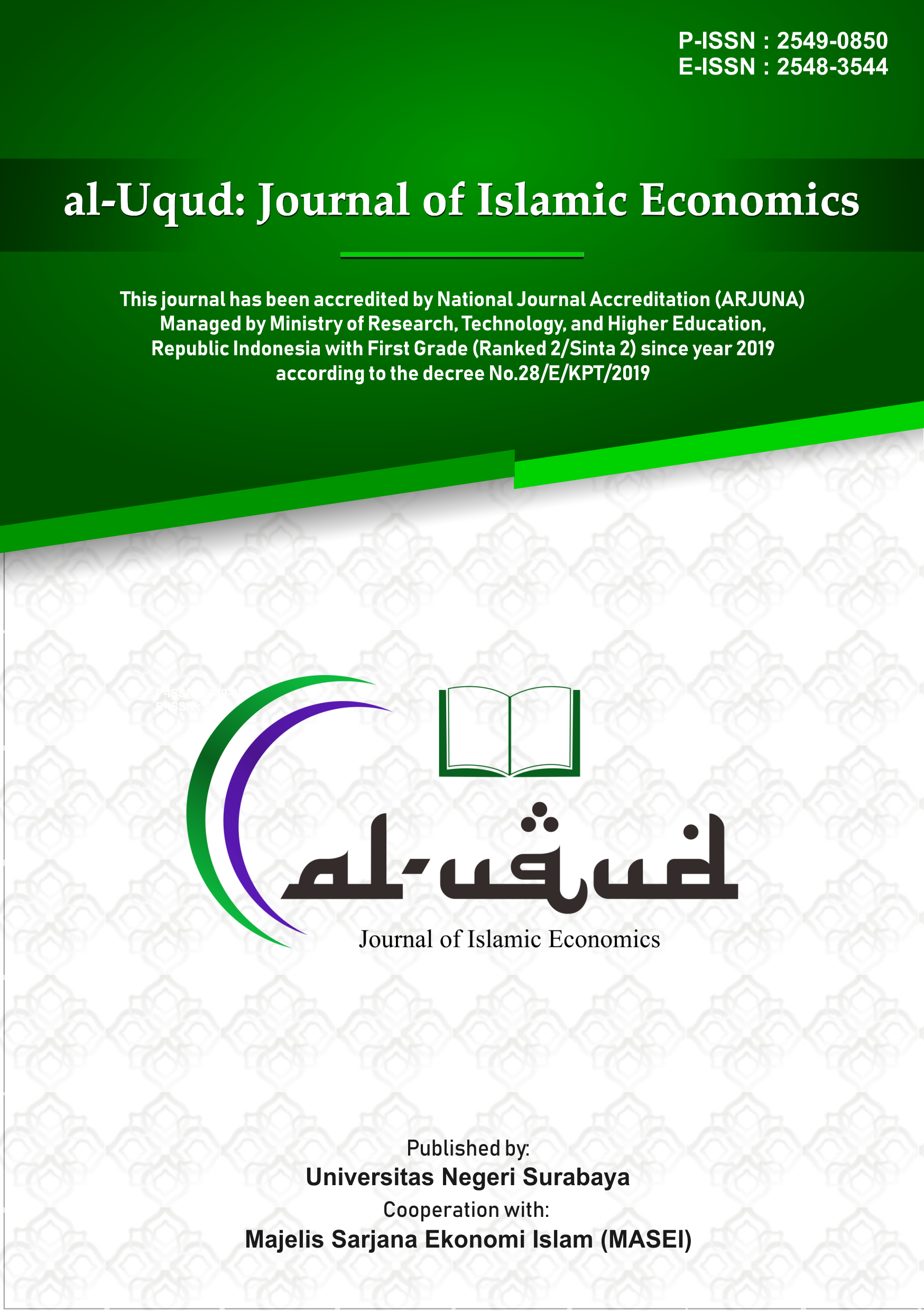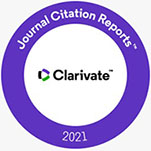Revisiting Islamic Economics of Nusantara: Conceptual and Legal Perspectives
DOI:
https://doi.org/10.26740/al-uqud.v4n1.p133-145Keywords:
Islamic economics, Nusantara, Joint ventures, KinshipAbstract
The development of Islam in Indonesia is inseparable from the economy because Islam initially came to Indonesia through trade. The teachings of Islam are embedded through economic activities such as in commerce and agriculture, although not uses Islamic terms specifically. As a result, many people are not aware that their economic activity becomes part of the implementation of the Islamic economics concept. Therefore, this paper aims to examine the implementation of Islamic economics in this country, both in terms of conceptual and formal legal practice implemented by the community. This study based on library research that focused on studying a variety of works of literature about the Islamic economic system and its implementation in Indonesia. Interviews and observation also collect the data to farmers and cattle ranchers that have taken as the sample. Furthermore, the data analysis employs a content analysis method to identify the specific characteristics of the information when data had been collected. The results of this study indicate that some of the Islamic economics concepts has been applied in the Indonesian daily economy activities. This reflects the manifestation of the 33rd Article of the Indonesian Constitution 1945 that emphasizes economic built by the cooperations and kinship principle. In the society who do farming and animal husbandry, for example, people implements "Paron" and "Gaduh" that use the same principles with musyarakah in the Islamic financing system.
References
Al-Harish, M. H. M. (2017). Indonesian Islam and Social Challenges Between Moral Cultivation and Intellectual Movement. Journal of Indonesian Islam, 11(2), 551-568. https://doi.org/10.15642/JIIS.2017.11.2.551-568.
Al-Nawawi. (1981). Sahih Muslim Bi Sarh Imam al Nawawi, VIII, Beirut: Dar al-Fikr.
Al-Maraghi, A.M. (1946). Tafsir al-Maraghi.Mesir: Musthafa al-Halaby.
Al-Jarhi, M. A. (2017). An Economic Theory of Islamic Finance. ISRA International Journal of Islamic Finance, 9(2), 117-132. https://doi.org/10.1108/IJEF-07-2017-0007.
Askari, H., Iqbal, Z., Krichene, N., & Mirakhor, A. (2014). Understanding Development in an Islamic Framework. Islamic Economic Studies, 22(1), 1-36. https://doi.org/10.12816/0004129.
Al-Zuhaily, W.(1984). Al-Fiqhu al-Islamy wa Adillatuhu Damaskus: Dar al-Fikr.
Baidhawy, Z. (2012). Distributive Principles of Economics Justice: An Islamic Perspective. Indonesian Journal of Islam and Muslim Societies,2(2), 241-266. https://doi.org/10/18326/ijims.v2i2.241-266.
Diwyanto, K. & Priyanti, A. (2008). Keberhasilan Pemanfaatan Sapi Bali Berbasis Pakan Lokal Dalam Pengembangan Usaha Sapi Potong Di Indonesia. Indonesian Bulletin of Animal and Veterinary Sciences, 18(1), 34-45. https://doi.org/10.14334/wartazoa.v18i1.910.
Djazuli. (2010). Ilmu Fiqh. Jakarta: Fajar Interpratama
Febrianto, N. F. & Wahyuningsari. (2017). CLC (Centered Learning Circular): Metode Revitalisasi Keilmuan Ekonomi Islam Untuk Kalangan Mahasiswa. Journal of Islamic Economic, (1)1, 83-94, https://doi.org/10.26740/al-uqud.v1n1.p83-94.
Huda, N. (2007). Islam Nusantara; Sejarah Sosial Intelektual Islam di Indonesia. Jogjakarta: Ar-Ruzz Media Group.
Hokelekli, H. (2012). Religion, Religiosity, and Research in Psychology of Religion in Turkey. Ilahiyat Studies, 3(2), 223-245. https://doi.org/10.12730/13091719.2012.32.60.
Hamzah, A. (1998). Al-Idarah Al-Islamiyyah Bi Indunisiyya. Indonesian Journal For Islamic Studies. 5(1), 111-147. https://doi.org/10.15408/sdi.v5i1.762.
Ibn al-Qayyim al-Jawziyah.(1993). Alam al Muwaqiin, Juz III. Beirut: Dar al-Kutub al-Ilmiyah.
Ismail, Faisal. (2011). The Nahdlatul Ulama its Early History and Contribution to the Establishment of Indonesian State. Journal of Indonesian Islam, 5(2), 248-282. https://doi.org/10.15642/JIIS.2011.5.2.247-282.
Ibnu Katsir, I.(2000). Tafsir al-Quran al-˜Adzim. Kairo: Muassasah Qartabah.
Isbah, M. F. (2019). External Influence and Supports to Pesantrens Socio-Economic Activism in the Changing Context. Journal of Economics and Business, 2(3), 329-370. https://doi.org/10.22515/shirkah.v4i3.271.
Khan, A.(2008). Kapitalisme di Ujung Tanduk; Tinjauan atas Krisis Global, Krisis Minyak, Krisis Pangan dan Bagaimana Sistem Ekonomi Islam Mengatasinya. Bogor: PustakaThariqul Izzah.
Kosec, K., Haider, H., Spielman, D. J., & Zaidi, F. (2018). Political Competition and Rural Welfare: Evidence from Pakistan. Oxford Economic Papers, 70(4), 1036-1061. https://doi.org/10.1093/eop/gpy013.
Luthfi, K. M. (2016). Islam Nusantara: Relasi Islam dan Budaya Lokal. Journal of Islamicate Multidisciplinary, 1(1), 1-12. https://doi.org/10.22515/shahih.v1i1.53.
Matta, M. A. (2014). Gelombang Ketiga Indonesia. Jakarta: The Future Institute.
Malik, M., K., Wahyuni, S., & Widodo, J. (2018). Sistem Bagi Hasil Petani Penyakap di Desa Krai Kecamatan Yoso wilangun Kabupaten Lumajang. Jurnal Pendidikan Ekonomi, 12(1), 26-32. https://doi.org/10.19184/jpe.v12il.6466.
Moleong, L. J. (2006). Metodologi Penelitian Kualitatif. Bandung: Remaja Rosdakarya.
Muhajir, N. (1990). Metodologi Penelitian Kualitatif. Yogyakarta: Rakesaraseh.
Naqvi, S. N. H. (1994). Islam; Economic and Society. London And New York: Kegan Paul International.
Nasution, M. E. (2006). Pengenalan Eksklusif Ekonomi Islam. Jakarta: Prenada Media Group.
Nasution, S. (1996). Metode Penelitian Naturalistik Kualitatif. Bandung: Tarsito.
Primada, B. S. & Zaki, I. (2015). Tinjauan Mekanisme Kontrak Pengelolaan Lahan Pertanian Berbasis Adat Istiadat Dalam Kajian Fiqh Muamalah (Desa Temu, Kecamatan Kanor, Kabupaten Bojonegoro). Jurnal Eonomi Syariah Teori & Terapan, 2(11), 954-969. http://.doi.org/10.20473/vol2iss201511pp%25p.
Priyono & Priyanto, D. (2018). Kemitraan Penggemukan Sapi Bali Berbasis Sumber Daya Lokal di Wilayah Lahan Suboptimal Nusa Tenggara Timur. Indonesian Bulletin of Animal and Veterinary Sciences, (28)2, 61-68. https://doi.org/10.14334/wartazoa.v28i2.1652.
Razavi, M. B. (2000). A Design For an Islamic Economic System. Iranian Economic Review, 4(4), 8-41. https://doi.org/10.22059/IER.2000.30876.
Rahardjo. (2004). Pengantar Sosiologi Pedesaan dan Pertanian. Yogyakarta: Gajah Mada University Press
Ridwan, B., Syahputra, I., Taringan, A. A., & Siregar, F. A. (2019). Islam Nusantara, Ulemas, and Social Media: Understanding The Pros and The Cons of Islam Nusantara Among Ulemas of West Sumatera. Indonesia Journal of Islam and Muslim Societies, 9(2), 163-188. https://doi.org/10.18326/ijims.v9i2.163-188.
Sadr, S. K. (2019). The Methodology of Islamic Economics. Iranian Economic Review, 23(4), 897-917. https://doi.org/10.22059/IER.2019.72996.
Sunanto, M. (2012). Sejarah Peradaban Indonesia. Jakarta: Rajawali Pers.
Suryanegara, A. M. (1996). Menemukan Sejarah Wacana Pergerakan Islam di Indonesia. Bandung: Mizan.
Sonbait, L. Y., Santosa, K. A. & Panjano. (2011). Evaluasi Program Pengembangan Sapi Potong Gaduhan Melalui Kelompok Lembaga Mandiri yang Mengakar di Masyarakat di Kabupaten Monokwari Papua Barat. Bulletin of Animal Science, (35)3, 208-217. https://doi.org/10.21059/buletinpeternak.v35i3.1095.
Siddiqi, M. N. (2009). Maqashid-e Shariat. Journal of King Abdulaziz University, Islamic Economics, 23(2), 235-244. https://doi.org/10.4197/Islec.28-1.11.
Shachmurove, Y. (2004). Economic Development in the Middle East. PIER Working Paper (4)22, 2-37. https://.doi.org/10.2139/ssrn.548362.
Swasono, S. E. (2005). Indonesia dan Doktrin Kesejahteraan Sosial; Dari Klasikal dan Neo klasikal Sampaike The End of Laissez Faire. Jakarta: Perkumpulan Prakarsa.
Sulton, Ahmad. (2016). Filsafah Nusantara Sebagai Jalan Ketiga Antara Falsafah Barat dan Falsafah Timur. Jurnal Ilmu-Ilmu Ushuluddin, 17(1), 17-28. https://doi.org/10.14421/esensia.v17i1.1275.
__________.(1986).Usul al-Fiqh al-Islami. Damaskus: Dar al Fikr.
__________. (2012).ApiSejarah,Vol. 1. Bandung: Salamadani.
Downloads
Published
How to Cite
Issue
Section
License
CC BY 4.0 Abstract views: 744
,
Abstract views: 744
, PDF Downloads: 620
PDF Downloads: 620








